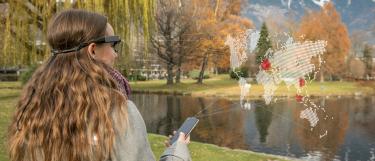
Human Geography
The Transient Spaces & Societies Research Group (led by Tabea Bork-Hüffer, Professor of Human Geography) explores how digital, cultural, and political transitions transform societies and space. The group investigates their implications for inclusion, exclusion, sustainability, and well-being.
Members of our research group, along with collegues from various disciplines working on digital, cultural, and political transitions of societies and space, regularly share insights on their newest work through our Transient Spaces Blog. Check back often for new posts, and feel free to reach out if you're interested in contributing!
We also regularly contribute to the organisation of events and conference sessions. Stay tuned for upcoming announcements and calls for sessions and papers at our events calender.
Staff

The Transient Spaces & Societies research group is an interdisiplinary and multilocal team. Our members come from diverse fields, these include digital, political, cultural, social, and urban geographies, the geographies of health, media and communication, political sciences, urban planning, and architecture. Explore our individual profiles by clicking the link below and searching for members under „Human Geography.“
Research

Digital, cultural, and political transitions are transforming societies and space at an increasing pace, from local to global scales. The Transient Spaces & Societies research group investigates how these processes impact inclusion, exclusion, sustainability, and well-being. A specific focus is on the role of various (emerging) digital technologies in socio-cultural negotiations, socio-political discourses, and power relations and shifts.
For Students

Members of our research group are involved in teaching across all degree programs in Geography. Our work with students and student researchers is guided by a student-centered, interactive, and research-led teaching and learning approach.
Transfer and Third Mission

We collaborate in transdisciplinary research and teaching to co-produce and share knowledge, engaging with stakeholders, including civil society. Science communication—through innovative formats and digital media—is both integral to our practice and a subject of our research.
